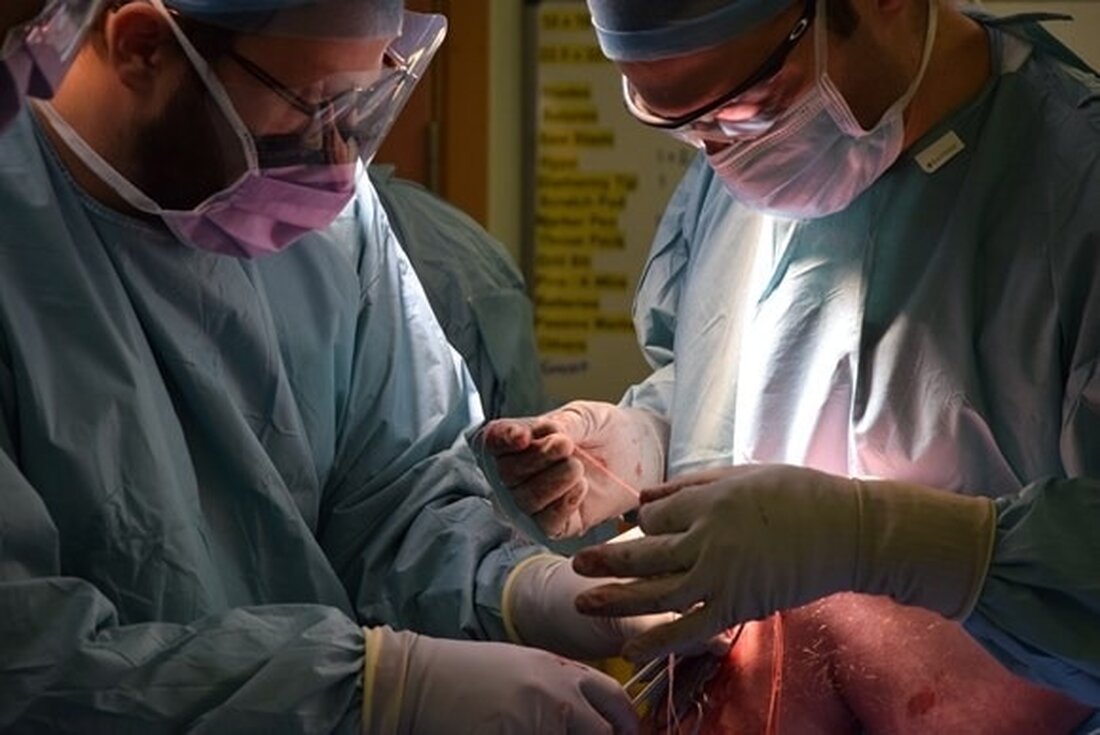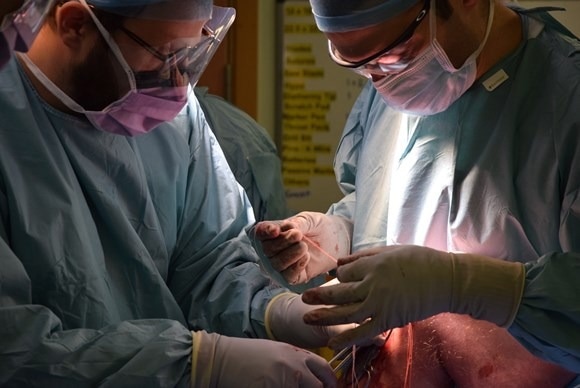NHS Golden Jubilee orthopedic surgeons carry out the first meniscus transplant in Scotland
NHS Golden Jubilee orthopedic surgeons have carried out the first meniscus transplant on a patient in Scotland. Photo credit: NHS Golden Jubilee Surgeons at University National Hospital, which carries out over 25% of all hip and knee replacement surgeries in Scotland, performed the innovative keyhole procedure and implanted donor cartilage into the patient's knee. It is hoped the transplant option will transform patient care for those in need by offering the procedure on the NHS Golden Jubilee. Each knee has two menisci, a C-shaped cartilage in the knee that acts like a shock absorber between the shinbone and femur. The meniscus can collapse due to trauma or...

NHS Golden Jubilee orthopedic surgeons carry out the first meniscus transplant in Scotland
NHS Golden Jubilee orthopedic surgeons have carried out the first meniscus transplant on a patient in Scotland.
Photo credit: NHS Golden Jubilee
Surgeons at University National Hospital, which carries out over 25% of all hip and knee replacement surgeries in Scotland, performed the innovative keyhole procedure and implanted donor cartilage into the patient's knee.
It is hoped the transplant option will transform patient care for those in need by offering the procedure on the NHS Golden Jubilee.
Each knee has two menisci, a C-shaped cartilage in the knee that acts like a shock absorber between the shinbone and femur.
The meniscus can tear due to trauma or overuse. If the meniscus is damaged beyond repair, persistent knee pain or osteoarthritis may develop, potentially leading to the need for total knee replacement.
Meniscus transplants are suitable for certain younger patients and have the potential to significantly improve the quality of life of people who suffer from persistent knee pain due to damage or loss of their meniscus.
To perform this transplant, surgeons obtained a matched meniscus graft from a deceased donor from the United States. Using a camera as a guide, the new cartilage is implanted through a keyhole procedure under general anesthesia.
There is increasing evidence that this procedure may play an important role in preventing arthritis, which can be difficult to treat in younger patients, and in reducing the need for total knee replacement.
NHS Golden Jubilee orthopedic consultants Mr Christopher Gee and Mr Jon Clarke and Queen Elizabeth University Hospital (QEUH) orthopedic consultant Mr Simon Spencer worked together to carry out the procedure.
We are very pleased to be able to offer this operation as it is the first time this technique has been performed in Scotland.
The procedure attempts to restore the cushioning effect of the meniscus and thus preserve the joints well into old age. There is increasing evidence that it may help with symptoms and reduce the patient's chances of developing arthritis, which can be very difficult to treat in younger patients.
What we know is that 70 to 80% of people who have a meniscus transplant see an improvement in their symptoms.
There is a lot of evidence of good functional outcomes, so we want to be able to offer this procedure to many more people across Scotland.”
Mr Christopher Gee, NHS Golden Jubilee Orthopedic Consultant
While for many older patients with the condition a total or partial joint replacement might be the right option, for a young, active person like Matthew Watkins from Inverness, the idea of waiting in pain for years was daunting.
He said: “After I had an accident at the gym I developed severe pain which stopped me from mountain biking and hill walking, my knee swelled and it really affected my quality of life.
“I had basically destroyed the entire inside of my knee and damaged the actual bones, so the cartilage was worn out and needed to be repaired.
“More meniscus had to be removed to try and relieve some of the pain.
“In terms of how it felt immediately after, I could feel like there was something in my knee when I put weight on it, compared to how it felt before when I didn't have a meniscus there.
"I'm glad I had the surgery, I can really feel a difference."
After a careful process in setting up the service and working with NHS Greater Glasgow & Clyde, the Clydebank-based team ensured the procedure was safe for patients.
After discussing the case with Mr Watkins and going through a shared decision-making process, the team received approval from the local health authority, NHS Highland, to carry out the operation.
NHS Golden Jubilee is always committed to innovating and improving the patient experience.
We are one of the largest planned arthroplasty centers in Europe and carry out around 4,000 joint replacement operations each year - around 25% of all joint replacement operations in Scotland.
Although this technique has been used for the first time in Scotland and the operation is not yet widely available, it is clear that this operation has a real place for people with persistent pain following a torn meniscus.”
Christine Divers, Director of National Elective Services, NHS Golden Jubilee
“Introducing a new technology like this helps us provide person-centred care to people in extreme pain and gives us the opportunity to provide the patient with much-needed relief to support their recovery.
“This ground-breaking meniscus transplant shows that we are always striving to make progress and find new ways to improve the quality of life for our patients while continuing to improve care for the people of Scotland.”
Source:
.

 Suche
Suche
 Mein Konto
Mein Konto

